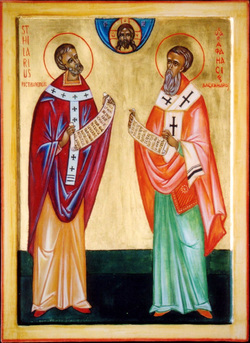
In the fourth year of his exile took place the Council of Seleucia in Isauria, at which Hilary was obliged to be present, but afterwards withdrew to Constantinople. Here he realized more sharply the awful nature of this crisis in the history of Christianity, published three pamphlets in the form of letters to the Emperor, and demanded from that Prince leave to hold a public disputation in his presence. The Arian Bishops Ursacius and Valens, whom Hilary had already confuted in writing, were afraid to meet him in debate, and therefore induced Constantius, under pretence of pardon, to send him back to his Bishoprick. His mother, the Church of Gaul, to use the language of Jerome, received him with open arms on his return from the battle with the hereticks. He was followed to Poitiers by Martin, afterwards Bishop of Tours, whose after holiness was a fruit of his teaching.
Henceforth he ruled the Church of Poitiers in great peace. By his exertions the Church of Gaul was led to denounce the Arian blasphemy. His wonderful learning is seen in his numerous works, of which Jerome writeth to Laeta that he deemeth them quite faultless. One can follow Hilary in his books, saith he, without tripping once. He passed from earth to heaven upon the thirteenth day of January, in the year of our Lord 369, in the reign of the Emperors Valentinian and Valens. He had already been called an illustrious Doctor of the Church, by many Fathers and Councils, and was so styled in the Liturgy in some dioceses, when at length, Pope Pius IX, at the prayer of the Synod of Bordeaux, and in accordance with a resolution of the Sacred Congregation of Rites, proclaimed and confirmed the title, and commanded that the Mass and Office of his Feast should be everywhere said as those of a Doctor.




